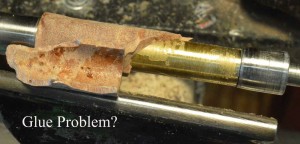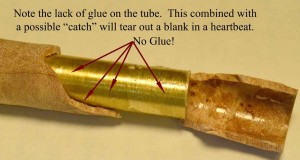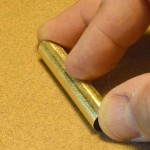I get calls every week from pen makers who ask why their pen blanks are blowing up. I ask them about when they blow up. They tell me it’s either when they first start to rough turn them, or when they are just getting to the end, right before they start to sand, is when they usually blow apart.
My answer to them takes a little bit of a different approach. I ask them what type of glue they use to glue the pen tube in, and then they ask me why I am asking them that question. My response is, if there is not enough glue on the pen tube, and you do catch it with your tool, it can rip the material right off the pen tube as illustrated above.
Try these steps to get a better result, and prevent a blowout.
- Make sure that the pen tube is roughed up. Use 100 grit sandpaper so your glue has something to grab on to.
- Place the medium CA glue on the pen tube and cover it completely. Not so much that it is dripping all over the place, but make sure you have enough to coat the whole tube.
- Insert the tube in one end of the pen blank. Move it in and out of the pen blank a few times to distribute the glue along the blank.
- Turn the pen blank around, and repeat the procedure until the inside of the pen tube “looks wet”, and you are sure that the entire length of the pen tube has a nice, even coating of glue.
- Place the pen tube inside the pen blank once more and let it dry thoroughly.
- Turn it, and enjoy a blowout-free experience
Try this technique and it may save you from a major repair one day!
Happy Turning!



















Stephen Kazanjian liked this on Facebook.
Jim Martin liked this on Facebook.
That’s a great tip, Barry…had that happen to me a couple of times myself, until I learned to do as you suggested. Another cause of “blank blowout” is when you are dealing with burl-type materials or natural/acrylic combination blanks…insufficient bonding between the constituent materials. Non-aggressive, lighter cuts are the key with these materials. Sometimes, I’ll even coat with thin CA glue to give the whole thing more integrity. Additionally, I have had an issue one or two times with pure acrylic material where two adjacent swirl colors seem to not have bonded together quite sufficiently. This is rare, and difficult to anticipate. Lastly, the other time that I have had issues with blowout is during the barrel-trimming phase, using drill and barrel trimmer. One of the keys there, besides proper gluing, is to not be too aggressive. Using a disc sander can help a lot with this too as it doesn’t grab the wood the way the blades on the barrel trimmer sometimes can.
You are correct, lighter bites and sharper tools will help. I do not use a barrel trimmer in my home shop I ONLY use the squaring jig. Especially since we now have a complete set of barrel trimmers!
Barry I was having blow out problems until I came up with what I call a brilliant idea. I took a pair of inside snap pliers, ground off the tip now I can hold the tube WITHOUT getting C A on my fingers allowing me to roll the tube in C A making sure that it was totally covered and then insert the tube into the blank then rotate using the snap ring pliers
Don, good tip – glad it works for you!
Bob Pegram liked this on Facebook.
Jimmy Corbin liked this on Facebook.
Arizona Silhouette liked this on Facebook.
Works for me!
Rick Raskin liked this on Facebook.
Robert Bakken liked this on Facebook.
Steve Haymon liked this on Facebook.
Excellent
Arthur Miller liked this on Facebook.
The Woodworking Shows liked this on Facebook.
I’ll have to try this Barry, as I’ve developed a problem of blowout lately….Thanks for these tips and please keep them comming…..